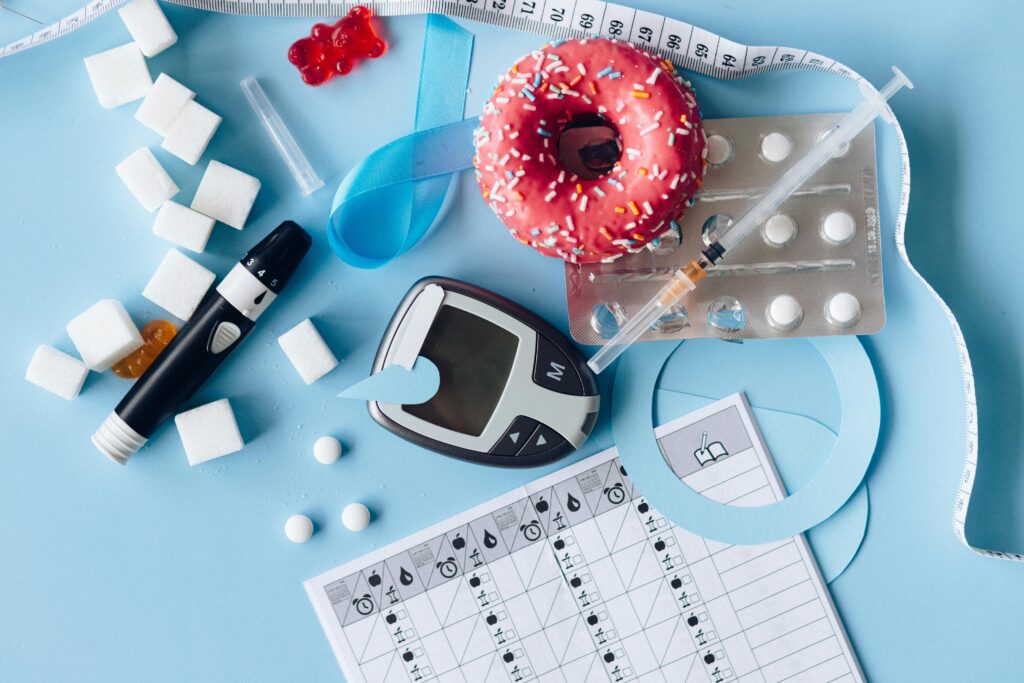SGLT 2 Inhibitors
Most diabetes experts now recommend SGLT-2 inhibitors as the first line choice for patients with type 2 diabetes. Compared to most other diabetes medications, and these agents have the unique ability to improve diabetes control & protect the heart and the kidney.
- SGLT 2 INHIBITORS:
These medicines work by promoting excretion of glucose in the urine. Since the body is getting rid of more glucose, blood glucose levels are lowered. Glucose is a major source of calories & net loss of glucose/calories from the body leads to weight loss in most patients.
- MEDICATIONS:
Medicines in this group include:
JARDIANCE (Empagliflozin)
FARXIGA (Dapagliflozin)
INVOKANA (Canagliflozin)
STEGLATRO (Ertugliflozin)
These medications are also available in combination with metformin or other diabetes medications. The combination medications include:
JARDIANCE + METFORMIN OR METFORMIN XR (SYNJARDY or SYNJARDY XR)
FARXIGA + METFORMIN XR (XIGDUO XR)
INVOKANA + METFORMIN (INVOKAMET)
STERGLATRO + METFORMIN (SEGLUROMET)
JARDIANCE + METFORMIN XR + TRADJENTA (TRIJARDY XR)
STEGLATRO + JANUVIA (STEGLUJAN)
- BENEFITS OF TAKING SGLT 2 INHIBITORS:
- They can usually be taken once a day, with or without food. Usually, patients take them in the morning.
- They do not cause hypoglycemia (low blood glucose levels); unless they are taking with insulin or sulfonylureas (such as glipizide or glimepiride)
- They usually cause weight loss.
- They usually lower the blood pressure level. If you are taking diuretics, you may be more prone to this lowering of blood pressure. You may feel dizzy or lightheaded and your doctor may decrease the dose of diuretics.
- They have been shown to have beneficial effects on the heart and the kidney. Patients who take these medications have been shown to have a lower risk of cardiac events, kidney failure, dialysis, and congestive heart failure.
- SIDE EFFECTS OF TAKING SGLT 2 INHIBITORS:
Most patients who take these medicines did not experience side effects. However, like all medications, SGLT 2 Inhibitors can cause side effects in some patients and very rarely, these can be serious. Some of the side effects include:
- Increased risk of local genital yeast infections (such as a vaginal yeast infection – also called Candida). The more common in women but in some men, these localized infections can occur at the tip of the penis. Patients taking these medications should look out for signs of these infections which may include white or yellowish vaginal discharge, vaginal itching, redness or itching at the tip of penis with or without discharge. These infections can easily be treated with topical or orally taken antifungal medications such as Diflucan. You may reduce the risk by keeping your blood glucose levels under control, maintaining good hygiene (after urinating, you can wash the private parts or use a wet wipe and then try and keep the area dry) and wearing loose-fitting cotton garments instead of synthetic fabrics).
- Slightly increased risk of urinary tract infections. Again, this increase occurs because of increased levels of glucose in the urine in patients taking these meds. But then, at some of these medicines work. If you develop frequent and painful urination or the urine appears cloudy or pink or lower abdominal or back pain, while taking these medications, call your physician for advice. In some cases, if this occurs repeatedly, you may have to stop these medications.
- Dehydration can occur particularly those patients who are also on diuretics or dose patients who are not eating or drinking.
- In some patients a slight increase in cholesterol level is noted. It is important to note however that patients taking these medications and the lower risk of cardiac events and cardiac death. Therefore, this increase in cholesterol level may not adversely affect the heart.
- Your physician may ask you to get blood tests were kidney functions, 1 or 2 weeks after starting SGLT-2 inhibitors. A small number of patients may experience an increase in blood creatinine level when they first start these medications. In most cases, things stabilize and in the long run, these medications actually reduce the risk of kidney problems or kidney damage in patients.
Some rare but serious side effects of SGLT 2 inhibitors include:
- Diabetic ketoacidosis (DKA):
This is an unusual complication of diabetes in which there is a buildup of ketones (a breakdown product of fat) which may cause too much acid in the blood, which can be dangerous. The symptoms to watch out for include nausea, vomiting, increased thirst, fast breathing, abdominal pain, drowsiness and extreme weakness. DKA is otherwise extremely rare in patients with type 2 diabetes. It is important to note that blood glucose levels may not be elevated in many of these patients.
DKA associated with SGLT 2 inhibitors is more likely to occur when your oral intake of food & liquids is reduced and you facing major stressful situations such as infections or surgery.
- Fournier’s gangrene:
Gangrene is a condition when body tissue is either died or dying because of reduced blood flow or severe bacterial infection. Fournier’s gangrene is a rapidly progressing, tissue destroying infection involving the genitals and the surrounding area (particularly the area behind scrotum in men and behind vulva in women. This condition is very rare and occurs in patients who have other severe medical conditions and quite often severe obesity and difficulty with personal hygiene. The symptoms may include pain in the perineum, tenderness, redness or swelling of the area from the genitals back to the anus and a fever.
- HOW TO PREVENT COMPLICATIONS & SIDE EFFECTS:
- Maintain good hygiene around the genital area. Wash the area after using the restroom or use wet wipes. Keep the area dry.
- Maintained good blood glucose control
- If you are undergoing a procedure or surgery which involves overnight fasting, you may need to stop SGLT 2 inhibitors 2 days before surgery and resume it only after you have started eating after the surgery
- Avoid very low carbohydrate diets when you’re taking these medications. The risk of DKA increases in this setting.
- If you develop an infection or gastroenteritis and you are not eating or drinking much, you need to stop these medications until you are feeling well.
- Avoid excessive alcohol intake
Post Disclaimer
We are not your healthcare provider, and your use of this website does not establish a patient-client relationship. All the information contained on this website is for informational purposes only. No material on this site is intended to be a substitute for professional medical advice (diagnosis, treatment, testing or nutritional information). Always seek the advice of your physician or qualified healthcare provider with any questions you may have regarding medical or health-related conditions or treatment. Your healthcare provider knows your condition or situation well and can give you specific advice which would be appropriate for your condition/situation. Your healthcare provider can also guide you more accurately about injection techniques, dietary interventions and the use of medical technology that is most pertinent and suitable for you. Please do not disregard professional medical advice or delay in seeking it because of something you may have read on this website.

